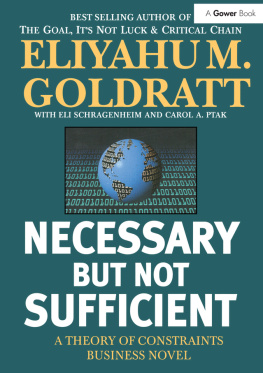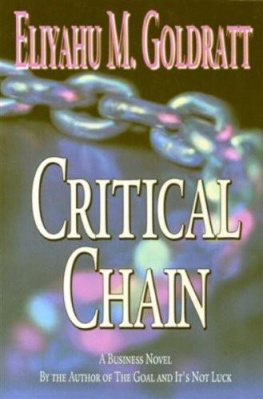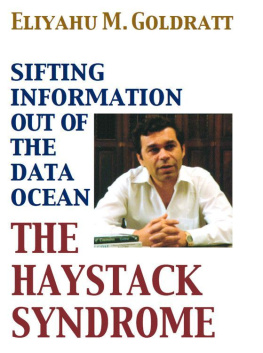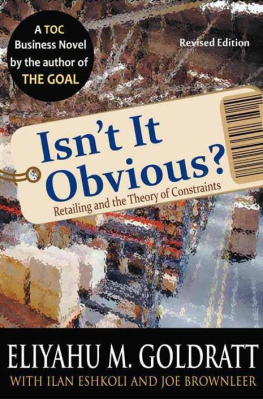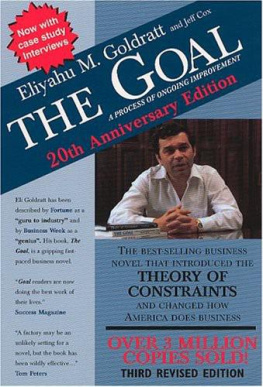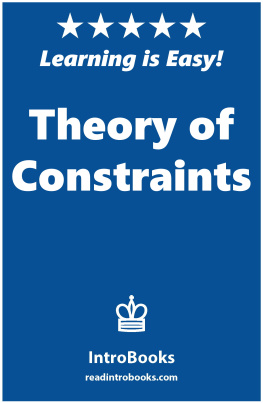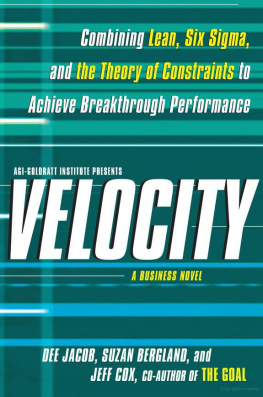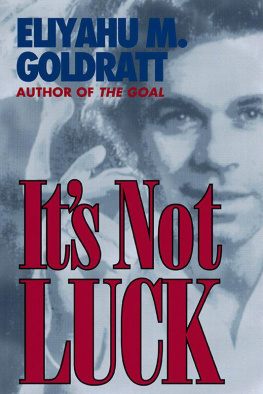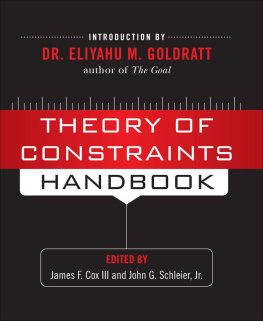Eliyahu M. Goldratt - Necessary But Not Sufficient: A Theory of Constraints Business Novel
Here you can read online Eliyahu M. Goldratt - Necessary But Not Sufficient: A Theory of Constraints Business Novel full text of the book (entire story) in english for free. Download pdf and epub, get meaning, cover and reviews about this ebook. year: 2005, publisher: North River Press, genre: Business. Description of the work, (preface) as well as reviews are available. Best literature library LitArk.com created for fans of good reading and offers a wide selection of genres:
Romance novel
Science fiction
Adventure
Detective
Science
History
Home and family
Prose
Art
Politics
Computer
Non-fiction
Religion
Business
Children
Humor
Choose a favorite category and find really read worthwhile books. Enjoy immersion in the world of imagination, feel the emotions of the characters or learn something new for yourself, make an fascinating discovery.
- Book:Necessary But Not Sufficient: A Theory of Constraints Business Novel
- Author:
- Publisher:North River Press
- Genre:
- Year:2005
- Rating:3 / 5
- Favourites:Add to favourites
- Your mark:
- 60
- 1
- 2
- 3
- 4
- 5
Necessary But Not Sufficient: A Theory of Constraints Business Novel: summary, description and annotation
We offer to read an annotation, description, summary or preface (depends on what the author of the book "Necessary But Not Sufficient: A Theory of Constraints Business Novel" wrote himself). If you haven't found the necessary information about the book — write in the comments, we will try to find it.
Eliyahu M. Goldratt: author's other books
Who wrote Necessary But Not Sufficient: A Theory of Constraints Business Novel? Find out the surname, the name of the author of the book and a list of all author's works by series.
Necessary But Not Sufficient: A Theory of Constraints Business Novel — read online for free the complete book (whole text) full work
Below is the text of the book, divided by pages. System saving the place of the last page read, allows you to conveniently read the book "Necessary But Not Sufficient: A Theory of Constraints Business Novel" online for free, without having to search again every time where you left off. Put a bookmark, and you can go to the page where you finished reading at any time.
Font size:
Interval:
Bookmark:

NECESSARY BUT NOT SUFFICIENT
OTHER BOOKS BY ELIYAHU M. GOLDRATT
The Goal
The Race
What Is This Thing Called Theory of Constraints?
The Haystack Syndrome: Sifting Information Out of the Data Ocean
It's Not Luck
Critical Chain
For more information on Eli Goldratt and his current projects visit: www.eligoldratt.com
A Theory of Constraints Business Novel
Eliyahu M. Goldratt
with Eli Schragenheim and Carol A. Ptak

First published 2000 by The North River Press
Published 2017 by Routledge
2 Park Square, Milton Park, Abingdon, Oxon OX14 4RN
711 Third Avenue, New York, NY 10017, USA
First issued in hardback 2017
Routledge is an imprint of the Taylor & Francis Group, an informa business
Copyright 2000 Eliyahu M. Goldratt
All rights reserved. No part of this book may be reprinted or reproduced or utilised in any form or by any electronic, mechanical, or other means, now known or hereafter invented, including photocopying and recording, or in any information storage or retrieval system, without permission in writing from the publishers.
Notice:
Product or corporate names may be trademarks or registered trademarks, and are used only for identification and explanation without intent to infringe.
ISBN 13: 978-1-138-41877-6 (hbk)
ISBN 13: 978-0-566-08450-8 (pbk)
NECESSARY BUT NOT SUFFICIENT
JANUARY 24, 1998
"Come on in" Scott stands up and shakes hands with Jay Johnstone, one of his account managers.
Calm and elegant, Scott Duncan looks more like an aristocrat than an American homegrown boy made good. At the age of 46, he heads one of the most successful computer software companies in the world.
"Have a seat." Scott gestures to the other side of his office. "I was wondering how we're doing with Alkar."
Jay lights up. Rumor has it that the nature of the discussion is indicated by on which side of Scott's office you sit. Those invited to sit in one of the chairs facing Scott's huge desk will go through a barrage of grilling, fact-finding, and an impatient string of questions. In five minutes or less you will find yourself outside the office feeling like a squeezed lemon.
But if you are guided to the other side, to one of those comfortable leather armchairs, you are likely to hear how you fit into the global picture. And there is nothing more interesting than hearing Scott Duncan unfolding the global picture. Not just his people, but now also the Wall Street analysts, are fascinated by his ability to read where businesses are heading. Business in general, and information technology in particular. Growing his company from a modest software house into the giant it is now, with a market value of well over ten billion dollars, certainly adds a lot of credibility to what otherwise might seem as daring speculation about new technology and its impact on the market needs and trends.
As they sit down, Jay repeats Scott's question, trying to find the most concise, yet impressive answer. "How are we doing with Alkar? Well, we were one of nine companies bidding for Alkar's business. Now it's only us and FDP"
"And?"
"And it looks good."
Scott's expression causes Jay to elaborate. "We followed our standard tactic, and it's working."
If a company wants to survive in the incredibly competitive large computer system market, it has to have a lot more than just a good product. Good selling tactics are essential when the average sale is a few million dollars, and deals of several hundred million are not rare.
Scott has carved out a unique tactic for his sales force. He noticed that computer systems rapidly expand to cover more and more clerical work and that the rapid expansion is not accompanied by suitable standards. He found a way to turn this handicap of the industry into a competitive edge.
Very early in the game, preferably before the client has even put out a formal request inviting the software companies to bid, his people have already done their homework. They have identified the "techies" involved in the prospect; the people who are likely to be the ones to do the more technical evaluations of the proposed systems. These professionals become their prime target. While the competition is busy trying to locate and build bridges to the decision makers, Scott's people are busy educating these targeted professionals. Not on how the BGSoft system works, that will not do. But how in general a computer system suitable for the prospect's type of industry should be designed; the pluses and minuses of the various possible configurations; which features are key, and which ones are just good at impressing the novices.
The whole idea is that by the time the real match is reached, and the proposals are compared by the selection team for best fit, the know-how planted by Scott's people is taken as the standard. In an industry where no real standards exist, it gives Scott's company a huge advantage.
Scott looks at his computer screen, "I see that FDP was forced to add many more features into their order-entry module before a final decision could be made."
"Yes," Jay smiles. "Their first and second tries were total flops. And yesterday they had their last chance to demonstrate the process of streamlining the financial data. We were told they only succeeded in embarrassing themselves. I think that Alkar is keeping them in the race just to squeeze better terms out of us."
"How are we doing on that front?"
"Better than expected. The budget is approved and we have agreed upon the number of concurrent users. I understand that KPI Solutions has finalized the negotiations on the implementation support." Jay leans forward and softly comments, "And we still haven't used our secret weaponthe option to charge maintenance on each module separately."
With confidence he adds, "Next Monday we meet with them to finalize the details. I don't expect any real problems."
Scott smiles. He waits until Jay is looking directly at him, then he gently asks, "If it looks so good, how come in your sales report..he pauses, and then continues more gently, "you estimated the probability of closing the deal this quarter at only fifty percent?"
Jay shifts uneasily in his chair. "It's only because..." He doesn't finish his sentence.
"You expect some surprises from FDP? Some last minute counter-attack?" Scott tries to help him.
"No, not really. My opinion is that for FDP it's too late. Nothing they come up with at this stage of the game will matter. It has nothing to do with FDP or the client, it's just..."
Jay is obviously uncomfortable. Then he gathers his courage, and finishes the sentence, "It's just that I thought you wanted us to be cautious."
"You mean my infamous first rule? My saying: 'be paranoid'?"
"That's right," Jay says sheepishly.
"So in your sales progress reports, that you know I read, you are trying to be paranoid?"
"Yes."
Scott leans back smiling. "Jay," he says, "if you want to mimic me, you must take into account that in my vocabulary, being paranoid means something quite different than the usual connotation. In my eyes, most people confuse being paranoid with what I call being shortsighted. Do you know how difficult it is to be truly paranoid?" He pauses as if he expects an answer.
Wisely, Jay doesn't reply.
"To be paranoid you must constantly assess the impact of your actions on the global picture. Which means that first you must relentlessly search for a deep understanding of the global picture. Do you understand?"
Font size:
Interval:
Bookmark:
Similar books «Necessary But Not Sufficient: A Theory of Constraints Business Novel»
Look at similar books to Necessary But Not Sufficient: A Theory of Constraints Business Novel. We have selected literature similar in name and meaning in the hope of providing readers with more options to find new, interesting, not yet read works.
Discussion, reviews of the book Necessary But Not Sufficient: A Theory of Constraints Business Novel and just readers' own opinions. Leave your comments, write what you think about the work, its meaning or the main characters. Specify what exactly you liked and what you didn't like, and why you think so.

